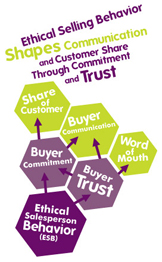INSIDER: Ethical Salesperson Behavior in Buyer-Seller Relationships
By Laura Tweedie, MBA Candidate
Marketing professors, Dr. John D. Hansen and Dr. Robert J. Riggle, conducted a cross-sectional study of 206 purchasing agents to evaluate the implications of ethical behavior with regards to buyer attitudes and behaviors. The results of this study confirmed several hypotheses showing that ethical salesperson behavior, or ESB, is a quality that can differentiate salespeople and increase positive outcomes.

Think Point #1: What is ESB?
Before discussing the implications of ethical salesperson behavior, or ESB, it is imperative to define the characteristics that comprise this sect of ethical behavior. The following descriptors denote desirable attributes of ethical behavior in the buyer-seller relationship:
- Honesty
- Fair play
- Full disclosure
- Promoting the welfare of the customer
- Providing factual communications
- Selling only those products and services believed to benefit the customer
- Promising only what can be delivered
- Treating customer information in a confidential manner
Think Point #2: ESB influences buyer trust and commitment
The study confirms the notion that ESB leads to buyer commitment and trust, two desirable outcomes of a strong sales relationship. As depicted in the empirical model, buyer trust and buyer commitment bridge the gap between other favorable outcomes in a positive buyer-seller relationship. Buyer trust is the primary result of ESB and is the building block for buyer commitment. To gain buyer trust, real estate agents and other sales professionals must demonstrate reliability and high integrity. Built on the foundation of trust, buyer confidence is increased by observable behaviors including consistency, honesty, fairness, responsibility and benevolence. Because buyers will feel less inclined to monitor the activities of ethical salespersons, they will perceive this buyer-seller relationship as more valuable, saving them both time and anguish.
Think Point #3: ESB influences share-of-customer
Share-of-customer refers to the amount of spending customers devote to a specific firm for a particular product. Share-of-customer percentages translate into the economical benefits of repeat patronage and brand loyalty. While the study did not indicate a direct relationship between ESB and share-of-customer, it was concluded that share-of-customer is indirectly influenced by ESB, through its positive relationship with buyer commitment. As buyer commitment increases, their investments in the specific buyer-seller relationship, based on anticipated future returns, also rises.
Think Point #4: ESB influences buyer communication
Buyer communication refers to the transmission of both judicious and timely information by the buyer to the seller. In a buyer-seller relationship, enhanced communication benefits both parties. Specifically, timely and honest communication, initiated by the buyer, increases the success of the seller. The study shows that ESB indirectly influences buyer communication through the channels of both buyer commitment and buyer trust. Buyers who trust the ethics of a real estate agent or other professional salesperson feel more comfortable communicating openly. In addition, buyers who are more committed to an agent or salesperson will tend to share more information as a means for further developing the relationship.
Think Point #5: ESB influences positive word-of-mouth communications
Positive word-of-mouth communication is an interpersonal interaction where buyers share positive business reviews with their peers. These interpersonal communications carry more weight for future buyers, who often accept these recommendation with a high level of trust. ESB was found to indirectly influence positive word-of-mouth communications through the avenue of buyer trust. Of all the positive outcomes, ESB is most significantly related with an increase in positive word-of-mouth communications. The study confirms: buyers will more often recommend salespeople that display ethical behavior.
. . . . . . . . . . . . . . . . . . .
Recommended Reading
Hansen John D. and Robert J. Riggle (2009), "Ethical Salesperson Behavior in Sales Relationships," Journal of Personal Selling & Sales Management, 29(2), 151-166.
. . . . . . . . . . . . . . . . . . .
About The Author
Laura Tweedie, MBA Candidate, May 2011
Baylor University Graduate Assistant, Keller Center for Research.
Laura is a first-semester graduate student from Houston, Texas. She earned her BBA with a concentration in management from The University of Texas.